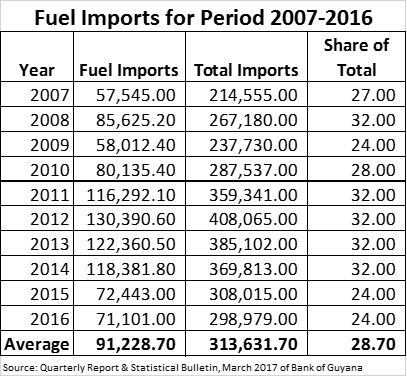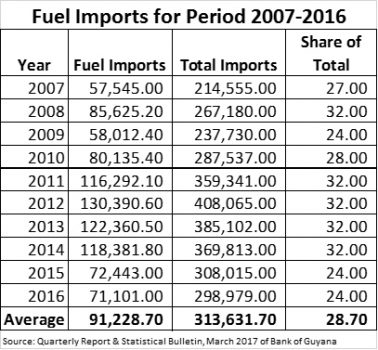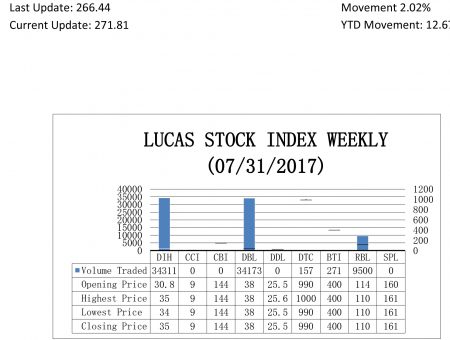Any and everything

Modern world
What is known is that in the modern world in which people live there is a need for energy. The scientists most likely will throw all forms of energy at people. But, when most people speak of energy, they generally refer to energy used for doing useful work. Things like industrial processes, transportation, electronic systems and the like come to mind. According to the scientists, energy exists in a resting potential form or in a kinetic form where it is being transferred in some way, whether through motion, heat, electricity, or other means. With the way in which GPL behaves, the thing that seems to rest mostly on the minds of Guyanese is electricity. But tax policy on the importation of motor vehicles reveals also that policymakers in Guyana are concerned with energy transferred in the form of motion. The many stories about the smuggling of fuel and the attempts to curb it reinforces the latter viewpoint.
Large amounts of potential energy are stored in coal, oil, natural gas, sunlight, and radioactive metals, hence their common use as fuels. Suffice to note that energy could be gotten from other naturally occurring sources, such as water in the form of hydropower, and wind. The aforementioned materials are often considered sources of energy, even though the scientists and energy experts would dispute such a characterization. A conversation about energy would lead one down a path that is of greater interest to scientists than to persons who just want to have some fuel or electricity to get things done at home or at work. The interest in energy in this article is its importance to the daily lives of people who must survive in a competitive world. Its availability and price matter to their wealth and prosperity as much as it does to their education, health and general wellbeing.
New and serious twist
However, concerns about global warming and its impact on climate change have added a new and serious twist to the preoccupation of energy and the type that is used by households and businesses. Quite often the usefulness of energy is placed on the backburner of energy policy in favour of concerns about its unhealthy impact on people. This conflict keeps playing out more and more within and between countries as everyone jockeys for a favourable position of the sustainable development path. People want access to the cheapest and most available type of energy. The conflict therefore deepens with the involvement of the market. The market for these products matters because it shapes many decisions about investing in one form of energy or the other. In today’s world, coal and oil are among the cheapest forms of energy. When measured purely by price, coal and oil appear very attractive. Indeed, low prices of these two commodities tend to discourage investments in alternative sources of energy. But as people understand the phenomenon of climate change, they may soon realize that what they gain on the downswing in the price and profits of these two products, they lose on the upswing of their harmful environmental effects.
Each day the world is confronted with competitive stories about the importance and destructive nature of fossil fuels. According to an analysis that was done by the European Union (EU), the market that favours coal, oil and even nuclear fuel was one that continued to reject the full impact of the negative externality of these sources of energy on people and their environment. At the same time, others laud the value of coal mining, for example, to job creation and the welfare of families that depend on those jobs. Energy is therefore about economics and one’s livelihood.
A more comprehensive look
A more comprehensive look at the supply of energy that took account of factors like air quality, toxicity and climate change tells a different story. It indicates that onshore wind power, a renewable form of energy, was cheaper by leaps and bounds when compared to gas and coal and matched the cost of nuclear energy. The EU study is not the only good news for renewable energy sources. While the favourability of wind made its way to the top of the energy ladder in the EU study, good news has emerged in many developing countries. Solar has become the cheapest source of new energy in nearly 60 countries in the developing world.
The move towards the mitigation of climate change is not enough to discourage the more troubling forms of energy. Reports indicate that the world could expect another 1,600 coal plants to be built in the next decade in about 62 countries. This trend brings into question the ability of the world to meet the goals set in the Paris Agreement that was reached at the Conference of Parties in 2015. The Conference of Parties is the body that meets each year to address issues relating to climate change. It is the global forum that emerged from the United Nations Framework Convention on Climate Change (UNFCCC). It appears therefore that while the world says one thing, it does something else. This concern arises from indications that energy generated by coal would expand 43 percent over the next 10 years, a period in which all countries should be striving to achieve lower emissions of carbon dioxide in the drive towards sustainable development.
Commitments
Over a week ago, the United Kingdom (UK) announced that it was eliminating petrol and diesel cars and vans from the vehicles that could be used on its roads. It intends the policy to have full effect by 2040. This move follows an earlier commitment of the UK to phase out its coal plants by 2025. Evidence suggests that wind power was the cheapest source of electricity in the UK and with other alternative energy sources could become the dominant form of energy supply for the UK.
TABLE 1
The good news about alternative energy should be a source of encouragement to a country like Guyana, despite being on the verge of becoming a net oil-producing country. Guyana has depended primarily on oil as its source of energy. Oil is used to supply electricity to households and businesses. It is used to power motor vehicles, motor cycles and equipment used in weeding and yard cleaning. The fishing boats and the aircrafts in Guyana use oil to power them as well. The biggest use of oil in Guyana is for the supply of electricity. The data in the Table above shows that Guyana imported an average of $91 billion worth of fuel per year from 2007 to 2016. Fuel and related products accounted for nearly 29 percent of the import bill of the country which averaged $313.6 billion during the period in reference. There is some concern though that neither the fuel import bill nor the fuel consumption might be accurate because of the smuggling of fuel that is taking place.
Narrow window of opportunity
Much of the imported fuel was used to provide electricity to businesses and households in Guyana. Guyana’s move towards oil production within an estimated three-year time span places increasing pressure on its alternative energy plans and commitments. But news about what countries like the UK , other European states and many countries around the world are doing with respect to fossil fuels should make Guyana realize that it was coming late to the oil production party and that it should continue to stress alternative forms of energy. Guyana therefore has a narrow window of opportunity to enjoy the oil reserves that it has. In fact, the trend in oil consumption while rising in one part of the world is diminishing in other parts of the world. This development should be a warning to Guyana not to give up on its alternative energy plans. Guyana must continue to move towards solar, hydropower and wind energy sources.
LUCAS STOCK INDEX
The Lucas Stock Index (LSI) rose by 2.012 percent during the last period of trading in July 2017. The stocks of five companies were traded with 78,412 shares changing hands. There was one Climber and one Tumbler. The stocks of Banks DIH (DIH) increased 13.64 percent on the sale of 34,311 shares, while the stocks of Republic Bank Limited (RBL) fell 3.51 percent on the sale of 9,500 shares. In the meanwhile, the stocks of Demerara Bank Limited (DBL), the Demerara Tobacco Company (DTC) and the Guyana Bank for Trade and Industry (BTI) remained unchanged on the sale of 34,173; 157 and 271 shares respectively.








